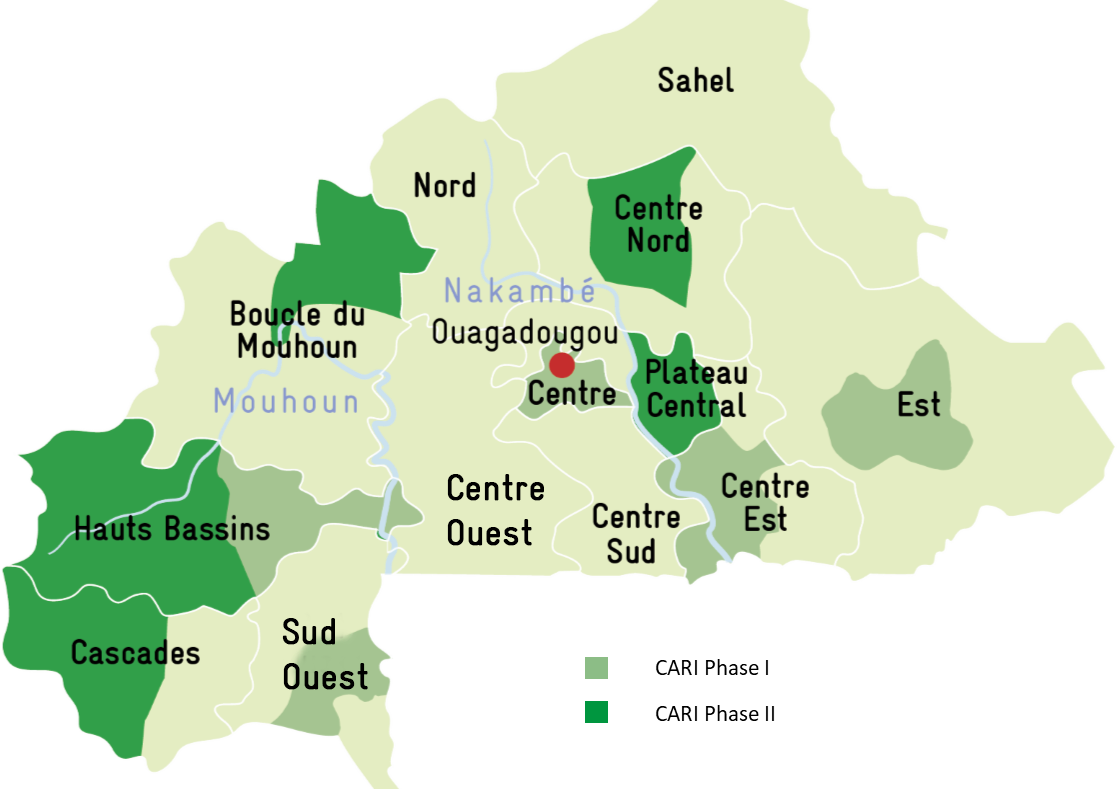Where we work
We, the Competitive African Rice Initiative (CARI), began in four countries, namely, Burkina Faso, Ghana, Nigeria and Tanzania, with the aim of integrating and empowering smallholder rice farmers to create sustainable business models within the rice value chain.
We see continued success and operate currently in Burkina Faso, Nigeria and Tanzania. In total with the help of multiple stakeholders, we were able to increase the income and food security of 799 000 beneficiaries. Additionally, we trained over 346 000 Smallholder farmers, while empowering 71 500 women and creating the equivalent of 22 900 full-time jobs.
150 000 farmers have also been engaged in inclusive business models through contracts with off-takers.
Explore this page to see a more interactive, illustrative representation, of our success, in the four partner countries where we work.
Burkina Faso
In Burkina Faso, we supported 17 000 farmers through GAP and FBS training. Furthermore, 56 000 smallholder farmers have increased their revenue, through inclusion in the rice value chain. On a national level, CARI has supported the creation of a favorable framework for smallholder farmers.
Beneficiaries have increased their income and improved their food security (including indirect beneficiaries)

Smallholder farmers have received trainings in good agricultural practices (GAP)
Smallholder farmers have received trainings in Farmer Business School (FBS)

Women supported

Full-time job equivalents created
Farmers engaged in inclusive business models through contracts with off-takers.
MF Partners:
Wend Konta | Rizerie Faso Malo |
Rizerie WendYam de Bobo | UNERIZ
Ghana
Since the inception of CARI in Ghana, 132 000 beneficiaries have been able to simultaneously and sustainably increase, their income and enjoy significantly improved food security. More than 65 000 smallholder farmers have been able to attend trainings increasing their knowledge and production capacities. 18 000 women have been supported in Ghana alone, while creating 3 600 full time jobs. Currently, 19 000 farmers are engaged in inclusive business models through contracts with off takers.
The implementation in Ghana ended in December 2019.
Beneficiaries have increased their income and improved their food security (including indirect beneficiaries)

Smallholder farmers have received trainings in good agricultural practices (GAP)
Smallholder farmers have received trainings in Farmer Business School (FBS)

Women supported

Full-time job equivalents created
Farmers engaged in inclusive business models through contracts with off-takers.
MF Partners:
Christian Aid | CRAN | Farmer Lane | Fysso | Okata | Savban | SATCO | Tamanaa | Wienco | Worawora
Nigeria
Since the inception of CARI in Nigeria, 430 000 beneficiaries have been able to simultaneously and sustainably increase, their income and enjoy significantly improved food security. Around 186 000 smallholder farmers have been able to attend trainings increasing the knowledge and production capacities. 30 000 women have been supported in Nigeria alone, while creating 15 000 full time jobs. Currently, 90 000 farmers are engaged in inclusive business models through contracts with off takers. We also introduced farmers to climate friendly agriculture (SRP) and technologies allowing for higher crop yields.
Beneficiaries have increased their income and improved their food security (including indirect beneficiaries)

Smallholder farmers have received trainings in good agricultural practices (GAP)
Smallholder farmers have received trainings in Farmer Business School (FBS)

Women supported

Full-time job equivalents created
Farmers engaged in inclusive business models through contracts with off-takers.
MF Partners:
AJIFA | Babban Gona | Danmodi | eHealth | Klysat | Masco | NAMDA | NSRIC | OLAM | Onyx | PFML |
Al-Salam | ATAFI | Green Sahel | KARDA | SeedFirst | WACOT | WOFAN
Tanzania
Thus far in Tanzania, we have provided 43 000 smallholders with GAP trainings and 35 000 smallholders with FBS training, allowing for the integration of 30 000 farmers into the rice value chain. These measures have improved the livelihoods of different actors along the rice value chain. Moreover, local processors have benefited from a reliable supply of high-quality rice additionally, creating better access to finances for local business have gained as result of improved linkages. Furthermore, national policies have created a more favorable environment for smallholder farmers.
We achieve this together with our implementing partner Kilimo Trust.
Beneficiaries have increased their income and improved their food security (including indirect beneficiaries)

Smallholder farmers have received trainings in good agricultural practices (GAP)
Smallholder farmers have received trainings in Farmer Business School (FBS)

Women supported

Full-time job equivalents created
Farmers engaged in inclusive business models through contracts with off-takers.
MF Partners:
BioSustain | Kilombero Plantation | Kimolo Super Rice | ZANRICE | G2L | Majinjah | Mamboleo Farm | Musoma Food | Petrobena | Raphael Group

